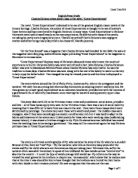Dickens also shows us that court proceedings were very different from todays. He also shows us that he is no fan of the various corrupt things going on in the courthouse. As we will see in the following examples:
One way in which court proceedings were different from those today, was the very fact that even though it was talked about a lot, (justice in the British Empire?), at the time, justice really was not blind. We can see this from when Abel Magwitch and Compeyson are both on trial and Compeyson gets less of a sentence, (seven years) than Magwitch (fourteen years), all because of the fact that Compeyson had ‘been to public boarding school’, ‘had learning’, ‘a smooth one to talk’, ‘dab at the ways of gentle folks’, ‘good looking’ and ‘had a handsome set of clothes’. In other words the judge favoured Compeyson, though he was the mastermind and leader because of his class, knowledge and exterior appearance.
We see again how opposite today’s courts are to the courts of ‘Great Expectations’, when we come to the scene where Magwitch is on his final trial, ill and frail. In this trial, some fifty years since his childhood, Magwitch’s childhood wrongdoings are added to the list of convictions. These days juries are not told about a criminals previous misdemeanours.
Also in court, many rich people would come to watch trials as a form of entertainment. Dickens describes it as a ‘large theatrical audience’ and talks of the drunken justice minister asking Pip if he would like to ‘step in and hear a trial or two… give him a front place for half a crown… with a full view of the Lord Chief Justice in his wig and robes’.
Another way which criminals were mistreated was the fact that they often be publicly humiliated in various methods, which by today’s standards could be constituted as a violation of human rights and seen in only the seediest of states. However as we can see through ‘Great Expectations’, the politicians of the time saw little wrong with public whippings, hangings and being put in the stocks. All of these events attracted a very large, cheering crowd.
Another way of humiliating the criminals, of which Dickens’s disapproval almost seeps through the pages of the book, was public mocking. Again the young Magwitch is a prime example: as he was shunned from town to town he was called the ‘scourge of society’ and ‘possessed by the Devil himself’.
Dickens does not make a huge, blaring propaganda out of these issues to do with corrupt courts. He doesn’t plainly say them for you to hear but instead he very quietly describes the trial, criminals and judges in a way that is far more profound and stirring to the human mind. ‘Two and thirty men and women… some looking defiant, some terror stricken, some sobbing…’
Dickens also uses Joe, (Pip’s uncle), as a ‘voice of morality as well’. When Magwitch is being captured early in the book and admits to have eaten Joe’s pork pie without his consent, all Joe does is say, “I don’t know what you’ve done but I wouldn’t have starved you to death for it.”
One thing indirectly involved with the judiciary system portrayed in ‘Great Expectations’ that I found rather funny was when Estella was coming down to London and was to meet Pip near Newgate prison. I find it interesting that Dickens uses Estella and the prison as foils and puts this view across using Pip; ‘I thought of the beautiful young Estella, proud and refined, coming toward me, and I thought with absolute abhorrence of the contrast between her and the jail’. The funny part is the fact that this whole statement is quite ironic as Estella is the offspring of two criminals; she should have been in Newgate from the beginning of her life according to what was done with the children of convicts in those days.
Apart from judges being corrupted, lawyers also were. Mr Jaggers who definitely knew that Estella’s mother was a murderer still took up her case and got her successfully acquitted, even though he fully knew she was wrong and what he was doing was dishonourable:
‘I don’t feel it. How did she murder? Whom did she murder?’
‘Why the deed may not have merited quite so terrible a name’, said Herbert, ‘but she was tried for it, and Mr Jaggers defended her’…goes on to say ‘Jaggers got her cleared’.
In the many ways described it is that I come to the end and yet again say that Dickens is looking for social reform using the references in ‘Great Expectations’ to support him. Charles Dickens did not just write about the plight of the poor in England and the depths to which poverty drives the human spirit, but he actually spent time talking to criminals and the like. Though ‘Great Expectations’ is a story, Dickens’s disgust at public execution/torture, the social stigma attached toward criminals and their children and hypocrisy and corruption at the highest levels of the judicial system, is very plainly, (albeit subtly) shown.







